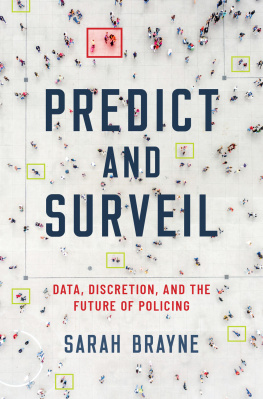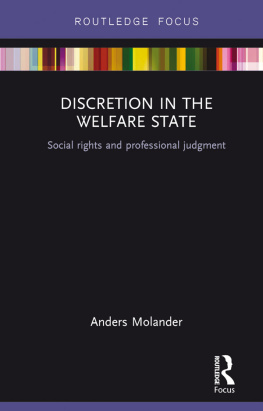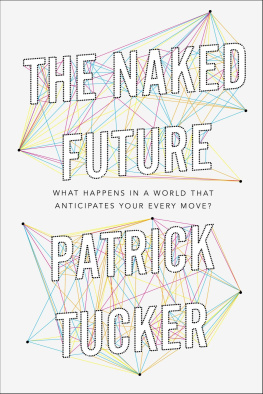Sarah Brayne - Predict and Surveil: Data, Discretion, and the Future of Policing
Here you can read online Sarah Brayne - Predict and Surveil: Data, Discretion, and the Future of Policing full text of the book (entire story) in english for free. Download pdf and epub, get meaning, cover and reviews about this ebook. year: 2020, publisher: Oxford University Press, genre: Politics. Description of the work, (preface) as well as reviews are available. Best literature library LitArk.com created for fans of good reading and offers a wide selection of genres:
Romance novel
Science fiction
Adventure
Detective
Science
History
Home and family
Prose
Art
Politics
Computer
Non-fiction
Religion
Business
Children
Humor
Choose a favorite category and find really read worthwhile books. Enjoy immersion in the world of imagination, feel the emotions of the characters or learn something new for yourself, make an fascinating discovery.
- Book:Predict and Surveil: Data, Discretion, and the Future of Policing
- Author:
- Publisher:Oxford University Press
- Genre:
- Year:2020
- Rating:3 / 5
- Favourites:Add to favourites
- Your mark:
- 60
- 1
- 2
- 3
- 4
- 5
Predict and Surveil: Data, Discretion, and the Future of Policing: summary, description and annotation
We offer to read an annotation, description, summary or preface (depends on what the author of the book "Predict and Surveil: Data, Discretion, and the Future of Policing" wrote himself). If you haven't found the necessary information about the book — write in the comments, we will try to find it.
Sarah Brayne: author's other books
Who wrote Predict and Surveil: Data, Discretion, and the Future of Policing? Find out the surname, the name of the author of the book and a list of all author's works by series.
Predict and Surveil: Data, Discretion, and the Future of Policing — read online for free the complete book (whole text) full work
Below is the text of the book, divided by pages. System saving the place of the last page read, allows you to conveniently read the book "Predict and Surveil: Data, Discretion, and the Future of Policing" online for free, without having to search again every time where you left off. Put a bookmark, and you can go to the page where you finished reading at any time.
Font size:
Interval:
Bookmark:


Oxford University Press is a department of the University of Oxford. It furthers the Universitys objective of excellence in research, scholarship, and education by publishing worldwide. Oxford is a registered trade mark of Oxford University Press in the UK and certain other countries.
Published in the United States of America by Oxford University Press
198 Madison Avenue, New York, NY 10016, United States of America.
Oxford University Press 2021
All rights reserved. No part of this publication may be reproduced, stored in a retrieval system, or transmitted, in any form or by any means, without the prior permission in writing of Oxford University Press, or as expressly permitted by law, by license, or under terms agreed with the appropriate reproduction rights organization. Inquiries concerning reproduction outside the scope of the above should be sent to the Rights Department, Oxford University Press, at the address above.
You must not circulate this work in any other form and you must impose this same condition on any acquirer.
Library of Congress Cataloging-in-Publication Data
Names: Brayne, Sarah, author.
Title: Predict and Surveil: Data, Discretion, and the Future of Policing / Sarah Brayne.
Description: New York, NY : Oxford University Press, [2021] |
Includes bibliographical references and index. |
Identifiers: LCCN 2020014315 (print) | LCCN 2020014316 (ebook) |
ISBN 9780190684099 (hardback) | ISBN 9780190684112 (epub) | ISBN 9780190684129
Subjects: LCSH: PoliceCaliforniaLos AngelesData processing. |
Crime analysisCaliforniaLos AngelesData processing. | Crime forecasting
CaliforniaLos AngelesStatistical methods. | Criminal behavior, Prediction of
CaliforniaLos AngelesStatistical methods.
Classification: LCC HV7936.A8 B73 2021 (print) | LCC HV7936.A8 (ebook) |
DDC 363.2/32dc23
LC record available at https://lccn.loc.gov/2020014315
LC ebook record available at https://lccn.loc.gov/2020014316
This book, and this research, were fundamentally shaped by Devah Pager. Devah was by my side from this projects inception. Her mentorship motivated, encouraged, and challenged me. It still doesalthough she passed away in 2018, she will always be my role model. There were countless moments as I was finishing this book when I wished I could ask her to read a passage or share her reaction. Instead, I am left to imagine what she would say. I am fortunate that a gracious community of researchers have offered to read this work through Devahs eyes, yet the final draft would surely have benefitted from one more pass from my brilliant advisor. This book is dedicated to her.
Turning to that gracious community, I must thank many who have given feedback on this bookwhether tiny fragments or the wholeover years and drafts. At Princeton, the inimitable Paul DiMaggio carefully thought through this project with me during its early phases, then lent his peerless attention to detail, right down to line edits, as I produced drafts. Ill never cease to wonder at his capacity to know something about everything. Kim Lane Scheppele was pivotal in formulating my research questions, and Janet Vertesi taught me much about the complex interrelation of technology and society. I am also grateful for the generosity and wisdom of Maria Abascal, Mitch Duneier, Elaine Enriquez, Edward Felten, Matthew Incantalupo, Rourke OBrien, Karen Levy, David Pedulla, Scott Lynch, David Reinecke, Matthew Salganik, and Robert Wuthnow.
My postdoc at the Social Media Collective at Microsoft Research New England was transformative. Nancy Baym, danah boyd, Christian Borgs, Jennifer Chayes, Kate Crawford, Kevin Driscoll, Tarleton Gillespie, Mary Gray, Shannon McGregor, and Lana Swartz strengthened my work and opened my mind. I benefitted enormously from the warm and energetic intellectual environment, stimulating conversations, and precious gift of time.
My colleagues at the University of Texas at Austinincluding but not limited to Amelia Acker, Minou Arjomand, Javier Auyero, Shannon Cavanagh, Diane Coffey, Rob Crosnoe, Jennifer Glass, Becky Pettit, Ken Hou Lin, Yasmiyn Irizarry, Abena Mackall, Chandra Muller, Kelly Raley, Mary Rose, Harel Shapira, Deb Umberson, and Christine Williamswelcomed me, influenced me, and showed me where to find the good tacos. Among the fantastic students at UT, I especially thank Riad Azar, Lindsay Bing, and Faith Deckard for their assistance with this manuscript.
I would not be where I am today without my mentors at the University of British ColumbiaNeil Guppy, Wendy Roth, and Dan Zuberiwho sparked my sociological imagination and encouraged me to apply to graduate school in the first place.
For inspiration, feedback, and many other kinds of support along the way, I thank Kristin Barragan, Danielle Citron, Liz Chiarello, Angle Christin, Andrew Ferguson, Barry Friedman, Sarah Lageson, Jeffrey Lane, John Laub, Ron Levi, Meredith McInnis, John Monahan, Katherine Newman, Laura Beth Nielsen, Andrew Papachristos, Samantha Pollard, Florencia Torche, Robert Sampson, Andrew Selbst, Michael Sierra-Arvalo, Ric Simmons, Christopher Slobogin, Chris Uggen, Bruce Western, and Katie Young. Special thanks to Issa Kohler-Hausmann and Forrest Stuart, who are absolutely brilliant scholars, friends, and ghouls.
James Cook, my editor at Oxford, had faith in this project from the very beginning and adeptly shepherded me through the publication process. Letta Page is a wizard who injected new life into this book through her edits. She is truly a master of her craft. David Hallangen created illustrations and offered comic relief. I also thank the anonymous reviewers of this book, as well as those that edited and reviewed related papers in the American Sociological Review and Social Problems.
I am grateful for having presented parts of this project and received helpful feedback from my peers at the following institutions and conferences: AI Now Institute, American Sociological Association, Brown University, Data & Society Research Institute, Duke University, George Mason University, Harvard University, Law and Society Association, MacArthur Foundation, Massachusetts Institute of Technology, Microsoft Research, New America Foundation, New York University, North Carolina State University, Northwestern University, the Ohio State University, Privacy Law Scholars Conference, Rutgers University, Stanford University, University of British Columbia, University of California at Davis, University of Chicago, University of Colorado Boulder, University of Massachusetts Amherst, University of Michigan, University of Pennsylvania, University of Texas at Austin, University of Toronto, University of Virginia, University of Washington, Vera Institute of Justice, and Yale University.
I received generous funding for various stages of this project from the Social Sciences and Humanities Research Council of Canada, Horowitz Foundation for Social Policy, Center for Information Technology Policy, NICHD (P2CHD042849), and the UT Austin College of Liberal Arts and Office of the Vice President for Research.
I thank the Los Angeles Police Department for providing research access. This project would not have been possible without individuals in the department opening their doors and allowing me to learn about doing police work. Although I cannot name them here, a few key individuals were integral in my fieldwork, and to them I am incredibly grateful. I also thank individuals within the Los Angeles County Sheriffs Department, the Center for Policing Equity, PredPol, and Palantir Technologies for helping with this research.
Font size:
Interval:
Bookmark:
Similar books «Predict and Surveil: Data, Discretion, and the Future of Policing»
Look at similar books to Predict and Surveil: Data, Discretion, and the Future of Policing. We have selected literature similar in name and meaning in the hope of providing readers with more options to find new, interesting, not yet read works.
Discussion, reviews of the book Predict and Surveil: Data, Discretion, and the Future of Policing and just readers' own opinions. Leave your comments, write what you think about the work, its meaning or the main characters. Specify what exactly you liked and what you didn't like, and why you think so.








